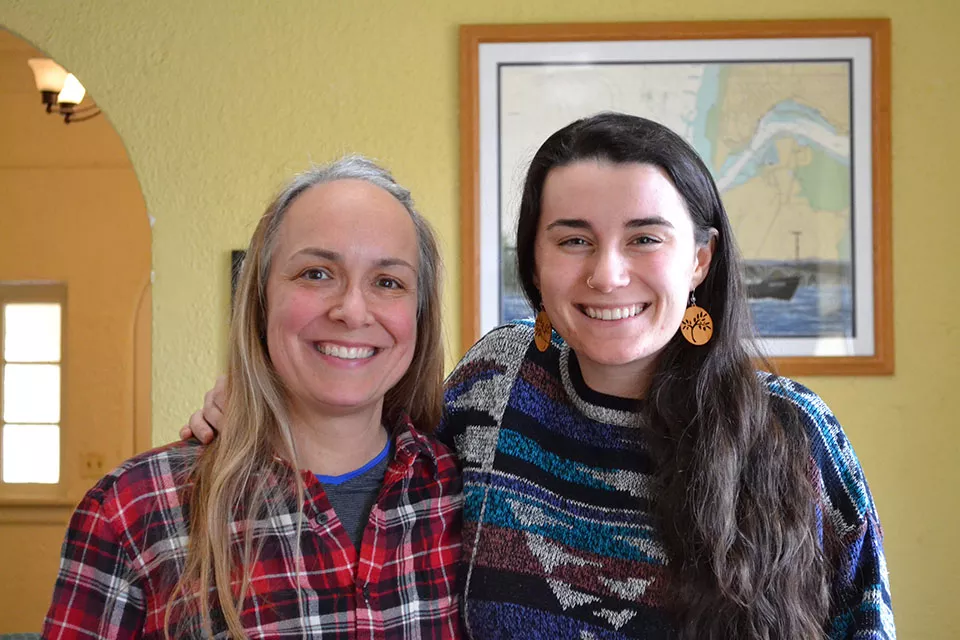
Colleagues are a wonderful thing – but mentors, that’s where the real work gets done.
— Junot Diaz
The CEOAS Academic Mentoring Program: forging connections and community
Nicole Rocco and Katherine Landoni are often seen together around CEOAS’ buildings, laughing and chatting – just two friends catching up. But a little over a year ago, they were near-strangers, separated in age by (ahem) a few years, before being introduced via CEOAS Student Services “matchmakers.”
Rocco, a graduate student in the Geology & Geophysics discipline, and Landoni, an undergraduate geology major, were matched by the CEOAS Academic Mentoring Program (AMP), a unique program, now in its third year, that pairs CEOAS graduate student mentors and undergraduate mentees. AMP’s goals are to provide the undergraduates with support, guidance and a window into the sometimes-mysterious world of graduate school, but the program reaps many more benefits along the way.
Grads and undergrads apply to participate in the program in fall term by filling out an application. Applications are reviewed and mentors and mentees are paired according to their interests by the program’s co-coordinators, Robert Allan, director of graduate student services, and Andrea Nelson, undergraduate academic advisor and experiential learning coordinator.
“There’s an art and a science to matching them up,” says Nelson. “We ask questions about what their current and future challenges are as students, and what they hope to get out of the program.” Rocco and Landoni, for example, are both interested in geology and share a research advisor: CEOAS Professor Adam Kent.
Participating students – currently about 30 undergraduates and their mentors – go through a brief training, and the program then runs for winter term. The pairs are asked to meet at least three times during the term.
“We provide a list of ‘AMP-friendly’ events as suggestions,” explains Allan. “They can go to a scientific seminar together, take a lab tour, or just sit and have coffee.”
Some undergraduate participants might be thinking about graduate school, while others might not even know what graduate school is. The program is designed to help the mentees explore their options with a sort of tour guide. “The mentors can help demystify grad school,” Allan says. “How do you apply? How do you find an advisor or a project? What’s a seminar? What’s a thesis defense? We need to break down barriers to participation.”
“One thing we encourage is having the graduate student mentors share their stories, their journeys,” Nelson stresses. “Some undergrads think it’s been smooth sailing for grad students, but those students had bumps along the way; we want undergrads to know about those potholes and challenges.”
For Rocco and Landoni, it worked best to keep things informal: mostly they sat and talked over coffee at the Beanery. They were already working in the same lab and shared a passion for geology and geochemistry (Rocco is working on the evolution of the Taupo volcanic zone in New Zealand, while Landoni is using geochemical techniques to date lava flows in central Oregon).
The mentor and mentee agree that the program was hugely valuable to both of them. Landoni mined Rocco’s brain for guidance about graduate school, and what’s more, she says, “I felt significantly more connected to the faculty and grad students in [CEOAS] as a whole, and I ended up getting a lot of help from the other grad students I met through Nicole.” She adds that it was particularly helpful to have a female mentor in the geosciences, allowing her to explore issues specifically related to being a woman in a still male-dominated field.
Rocco also gained a lot from the AMP experience. “My connection with Katherine allowed me to have a feel for, and a reminder of, the daily ins and outs of undergraduate life,” she says. “It’s also been nice to share my experiences and help undergrads gain confidence. When I was younger I didn’t have that confidence to reach out to a professor and sell myself to them. I have that more now, and it’s so rewarding to be able to share it with younger students trying to find their way.”
AMP’s coordinators are also finding that the program is benefitting the overall culture of the college. “We look at it as an opportunity to create a sense of community across the entire student body, and to help both mentor and mentee feel that they’re a part of something larger,” Allan explains.
When it comes to success of the program, Rocco and Landoni are Exhibit A. They remain friends a year after their official mentor/mentee relationship came to an end, and Rocco signed up for another year as an AMP mentor. Landoni is proud to announce that she has accepted an offer from the University of British Columbia to begin graduate school there in the fall, where she’ll be studying kimberlites, rare diamond-bearing magma. Currently a mentor herself for younger undergrads in the OSU Honors College, she’ll no doubt provide a shining example for undergraduates at UBC who want to know what this whole graduate school thing is all about.
Posted March 5, 2019 by Nancy Steinberg
See more feature stories and newer stories.